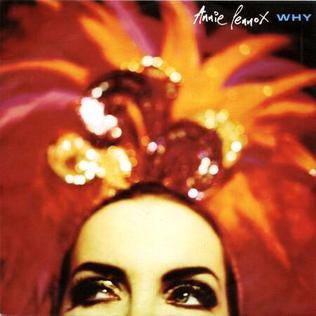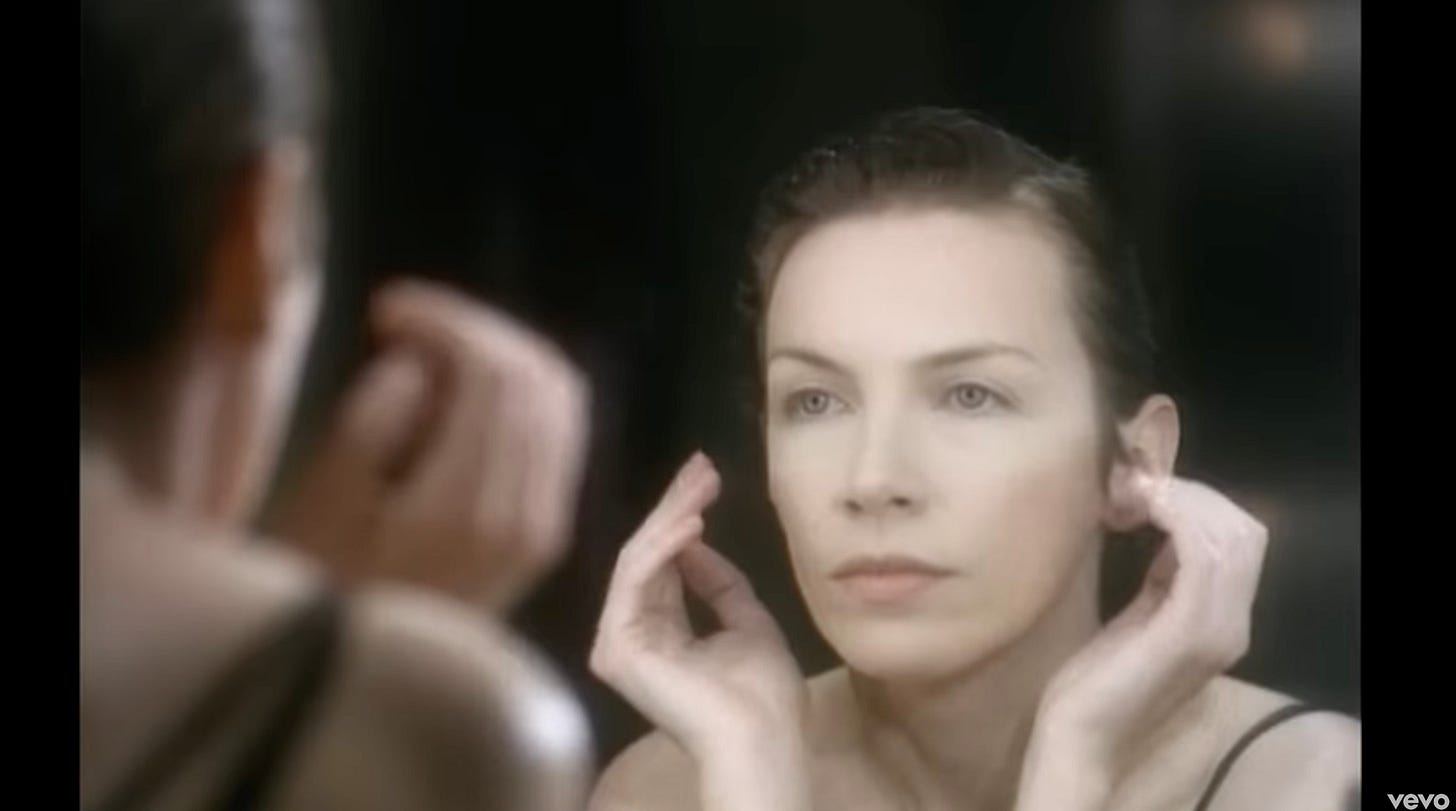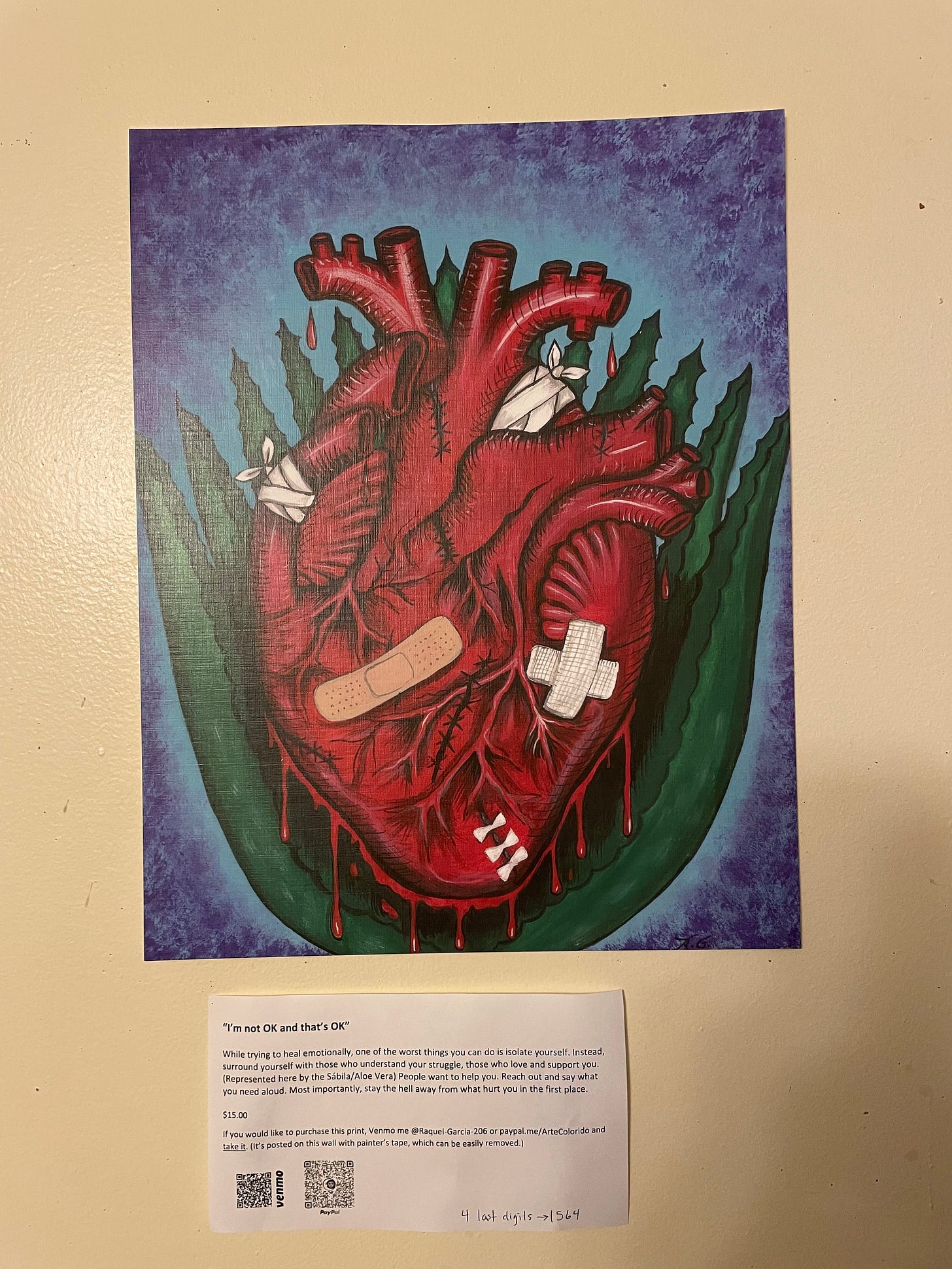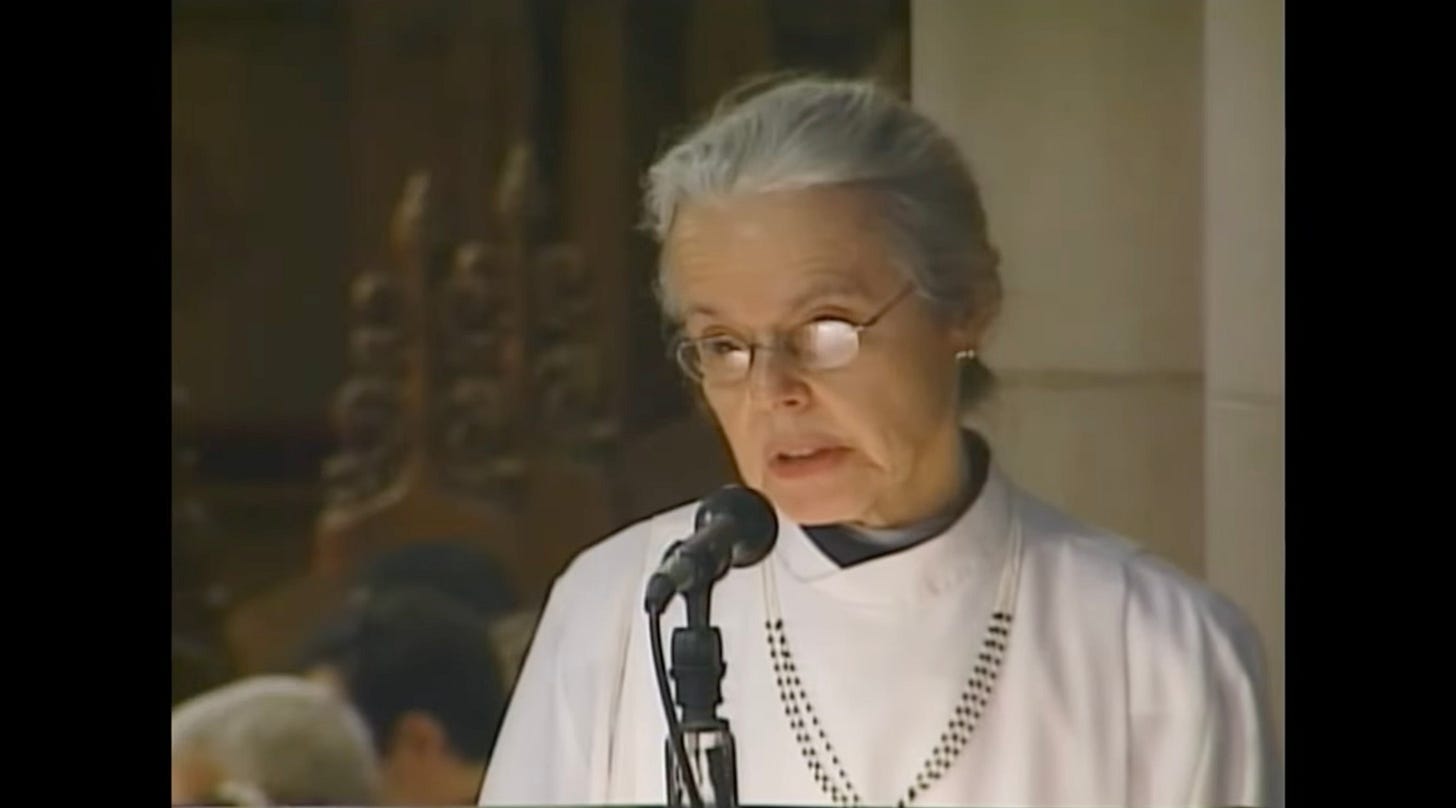Songs of Beginning Again: Why, by Annie Lennox
"These are the dreams I'll dream instead"
There was a time when I would consistently wake up between 2 and 3 am, without fail, night after night. My mind racing, unable to get back to sleep, I’d lie in bed, staring at the ceiling, until the gym opened at 5 am, and then I’d go and run as fast as I could for as long as I could. This daily routine went on for weeks, well over a month.
I cannot now recall how this song found its way to me in this season, of all the songs floating around in my psyche, but Annie Lennox’s haunting track, “Why,” (notice the omission of a question mark in the song’s title), became a companion. Her lyrics offered a tearful catharsis during a time when I felt like an alien in my own life.
Here at Notes on Beginning Again, I’m eager to explore songs, paintings, films, poems, and other creative projects that have been helpful for me and for others in the journey of beginning again. Today, we’ll take a close read of Lennox’s “Why,” and I’ll offer a few reasons why this song—which found its way back to me in the last month and has been haunting me all over again—continues to be a helpful companion for anyone in the process of beginning again.
A little backstory
But first, a brief introduction to Annie Lennox.
Born and raised in Aberdeen, Scotland, Lennox came to fame for her work with the new wave band Eurythmics. Following the birth of her first child and the breakup of Eurythmics, Lennox launched her solo career with Diva (1992).
“Why” is Lennox’s debut single from her debut album, released in March of the same year. Not yet 10 at the time, I cannot now recall when I first heard this song, but somewhere along the way I remember watching the track’s music video. Not as enigmatic (or, in terms of the music video, as creepy) as Lennox’s 1994 single, “No More ‘I Love You’s,” “Why” grabbed my imagination and planted itself there, rooted and growing latent for decades.
In the UK, “Why” reached number five on the country’s music charts; here in the states, the single peaked at number 34 on the Billboard Hot 100. In 2015, Stereogum rated “Why” the number one song in Annie Lennox’s work, writing this of the track:
“This was the song that you put on repeat to cope with that awful breakup because in every syllable she sings, you can hear that Lennox has been there too and feels just as bad as you do.”
Lyrical excavation
Lennox’s aching song begins with a single word, drawn out and undulating over peaks and valleys, and then repeated:
Why...
Why...
Experiences of rupture begin with a mentally exhausting path of trying to figure out, What’s going on? How did I get here?
This repetition of exhausting questions (futile though they may be), are only the beginning.
The song then turns to a series of hurts and, injury upon injury, a frustrating exchange (with herself as much as with another party):
How many times do I have to try to tell you
That I'm sorry for the things I've done, ooh. ooh, ooh
But when I start to try to tell you
That's when you have to tell me
Hey... this kind of trouble's only just begun
We’re not great at naming where we are our in the trajectory of our personal landscapes, be they grief or otherwise. We take our pulse. Check our reflection in the mirror. We think we’re further along than we are. Or, we think we’re only just getting started.
As Lennox puts it, we need help to locate ourselves in the midst of rupture, to know where we are on the journey of order, disorder, and reorder.
In Lennox’s case, the reminder is a painful one: you’re just getting started.
Of all the painful lessons in an experience of rupture, perhaps one of the most painful is learning when to speak up and when to stay quiet.
I told myself too many times
Why don't you ever learn to keep your big mouth shut
That's why it hurts so bad to hear the words
That keep on falling from your mouth
Falling from your mouth
Falling from your mouth
In the face of life-altering disruptions, some of us can’t keep quiet—replaying our hurt over and over, for anyone who will listen, inflicting on others our own sense of woundedness, looking for others to help carry the weight.
The temptation can be equally strong in the opposite direction. Others of us turn to silence, isolating ourselves in walls of introspection and ceaseless silent questioning, wondering if the words will ever return.
Ultimately, the goal and hope is the same: we’re looking for answers, looking for clarity.
Tell me
Why...
Why...
I may be mad
I may be blind
I may be viciously unkind
But I can still read what you're thinking
And I've heard it said too many times
That you'd be better off
Besides...
Why can't you see this boat is sinking
(This boat is sinking, this boat is sinking)
Lennox narrates for us the topsy-turvy, disorienting nature of such questioning (“maybe everyone would be better off?…”), the way such questions threaten to destroy us (if the rupture that got us here in the first place doesn’t do us in first).
Recently, talking with a new friend over coffee, he shared what he believed to be a divine word that he received in the early days of the loss of a long-term relationship, a word he needed most to hear:
“Divorce won’t kill you,” he heard. “Bitterness will.”
Another friend, Doug, is fond of saying something similar about healing in general:
“People either get better or they get bitter.”
It’s here, in a vortex of our wrestling with questions that seek to drown us, that Lennox’s song takes a more buoyant turn:
Let's go down to the water's edge
And we can cast away those doubts
Some things are better left unsaid
But they still turn me inside out
Turning inside out, turning inside out
The water’s edge as a place feels edenic, a welcome respite from our ceaseless questioning. Suddenly, we find more air to breathe, even if the “things left unsaid” still turn our stomachs, still shape us and misshape us. Even as we find ourselves breathing new life on the other side of this life-altering rupture, we’re left changed, marked by it in ways that will likely always be with us.
Tell me
Why...
Tell me
Why...
In the midst of her litany of questions, Lennox turns to what is to come on the other side of this rupture—a series of closures as well as openings:
This is the book I never read
These are the words I never said
This is the path I'll never tread
These are the dreams I'll dream instead
This is the joy that's seldom spread
These are the tears...
The tears we shed
This is the fear
This is the dread
These are the contents of my head
And these are the years that we have spent
And this is what they represent
And this is how I feel…
At this point in the Live 8 version of this song, performed live from Hyde Park, London in 2005, Lennox takes an unexpected, jarring pause at this point. A pause that strikes so suddenly you’re not quite sure if it’s a mistake. You check to make sure you didn’t unintentionally hit pause on the song.
Following her litany of an explanation—the fear, the tears, the dreams and the dread, all of it—before finishing her sentence, Lennox stops. She pauses. As if to honor all of what she’s just shared, all “the contents of [her] head.”
Then, after this pause, she speaks up again. She asks a singular question:
Do you know how I feel?
Looking for solidarity, perhaps, or connection, certainly, Lennox answers her own question:
'Cause I don't think you know how I feel
I don't think you know what I feel
I don't think you know what I feel
You don't know what I feel
Lennox insists the answer is “no.” No, you don’t understand. Even when those experiences are shared, common, or even universal—there’s something that remains uniquely our own. This is the pointed note she’s determined to end on.
Turning again to the Live 8 version of this track, 10 years after the studio recording of “Why,” this songs ends differently. Not with closure and isolation, but an open question:
Do you know what I feel?
Do you know what I feel?
Perhaps in the years since her initial recording, Lennox came to realize that understanding, connection, and solidarity, precisely at the site of life’s deepest of ruptures, may be precisely what she has to offer.
In the Book of Lamentations, a collection of poetic reflections from the 6th century BCE, the Hebrew author raises a question amidst the widespread destruction of Jerusalem at the hands of a conquering enemy—a question that sounds a lot like Lennox’s own question (or, perhaps, it’s the other way around):
“Look, O Lord, and see
how worthless I have become.
Is it nothing to you, all you who pass by?
Look and see
if there is any sorrow like my sorrow…” (Lamentations 1:11b–12a).
When the relationships, the work, the very lives we’ve worked so hard to build are burned to the ground, the question that haunts us is the same question the Hebrew poet asks amongst the rubble: “Is anyone’s sorrow like mine?”
In her Good Friday sermon at Duke Chapel in 2014, Old Testament Scholar Ellen Davis reflects on the Hebrew poet’s words from the Book of Lamentations. She notes that early Christian tradition put these words in the mouth of the suffering Savior.
“Is it nothing to you, this suffering of mine?"
“Is anyone’s suffering like mine?”
“The obvious answer ,” she notes, “is yes. ... Our suffering is a lot like yours. … It looks remarkably like yours”
In the most honest, aching account of our heartache, we find we’re not alone. Lennox’s song as well as the Hebrew poet’s words offer the reminder that we’re connected precisely here, at the site of our deepest wounds.
It is, perhaps, the reason why the poets’ words (Lennox’s as well as the author of Lamentations) have such lasting power. They are, finally, a word of hope.
“I thought my hope had died before God…” the biblical writer puts it. And we nod our heads. We know how you feel. And we start the song over again. Reminded, as we do, that we’re not alone. Not even here. Reminded that perhaps even our hope can begin again.
A playlist for Beginning Again
What songs would you include on a playlist for beginning again? I’m starting with Annie Lennox’s “Why.” I know there’s loads more tracks out there that belong on this playlist.
Let me know what songs you’d like to add in the comments and I’ll be sure to add them to our Songs for Beginning Again Spotify playlist.
As ever, thanks for reading, friends.
—Ryan





